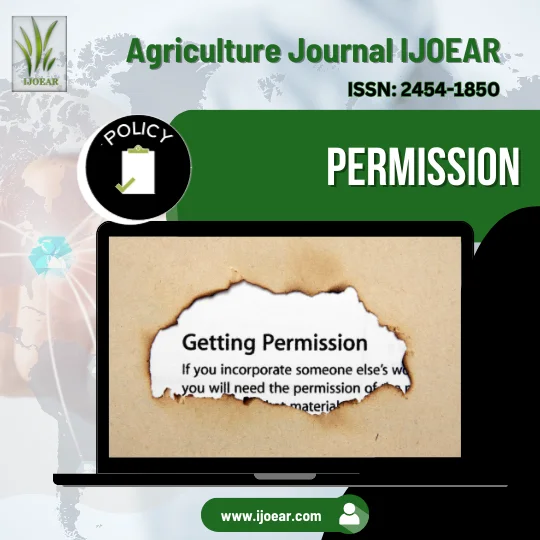 November 2025 Articles
November 2025 Articles Impact Factor: 6.69
Impact Factor: 6.69  Submit Article
Submit Article 
|
Citation Indices
|
All
|
Since 2020
|
|
Citation
|
6164
|
5117
|
|
h-index
|
31
|
29
|
|
i10-index
|
201
|
165
|
|
Acceptance Rate (By Year)
|
|
|
Year
|
Percentage
|
|
2024
|
11.09%
|
|
2023
|
15.23%
|
|
2022
|
12.81%
|
|
2021
|
10.45%
|
|
2020
|
9.6%
|
|
2019
|
14.3%
|
|
2018
|
17.65%
|
|
2017
|
16.9%
|
|
2016
|
22.9%
|
|
2015
|
26.1%
|

The International Journal of Environmental and Agriculture Research (IJOEAR), ISSN 2454-1850 (online), is a globally recognized peer-reviewed journal dedicated to publishing high-quality research in agriculture and environmental sciences. To maintain ethical publishing practices and uphold intellectual property rights, authors are required to seek permission for reusing copyrighted material in their manuscripts. This policy ensures compliance with international copyright laws and ethical standards, fostering a fair and responsible academic environment.
This document outlines the requirements for obtaining permissions, the responsibilities of authors, and the process for submitting evidence of permissions to IJOEAR.
Reproducing copyrighted material, including text, illustrations, tables, charts, photographs, or other content from previously published sources, requires explicit permission from the rights holder. Rights holders may include publishers, authors, or other entities that legally own the copyright.
Permission is necessary to:
Permission must be obtained in the following cases:
Reuse of any substantial part of copyrighted material, such as extended text excerpts, complete tables, or significant portions of figures or charts, requires permission.
If copyrighted material is adapted, modified, or altered, permission is still required to ensure compliance with copyright laws.
Any third-party material incorporated into the manuscript, even if credited, must have documented permission from the original rights holder.
In some cases, permissions may not be necessary:
Content in the public domain is free to use without permission. Authors must ensure the content is indeed public domain and properly cited.
Content published under Creative Commons licenses may be reused, provided the license terms are respected. For example, CC BY allows for reuse with proper attribution.
Authors may reuse their previously published content, provided they retain the rights or obtain permission from the publisher of the earlier work.
In limited cases, small portions of copyrighted material may fall under "fair use" or "fair dealing" exemptions. Authors should consult legal guidelines for their jurisdiction to ensure compliance.
Authors are responsible for:
The editorial team of IJOEAR is committed to ensuring compliance with the permission policy. During the review process, the editorial team will:
Determine who holds the copyright for the material you wish to use. This may be the publisher, author, or another entity.
Send a written request to the rights holder, specifying:
Keep a copy of the written consent for your records and provide it to IJOEAR upon request.
Ensure that the material is used in accordance with the terms outlined in the permission agreement.
An author wishes to include a table from a previously published paper in their manuscript. The author must:
An author includes a photograph from a field study published in another journal. The author must:
An author modifies a published diagram to fit their research context. The author must:
Failure to adhere to the permission policy may result in:
Yes, online availability does not exempt content from copyright protection. Permission is required unless the content is public domain or licensed for reuse.
It depends on the license. For example, content under CC BY can be used with attribution, but other licenses may have restrictions.
If permission cannot be obtained, you must exclude the material from your manuscript.
Yes, IJOEAR provides templates to assist authors in requesting permissions.
The permission policy of IJOEAR ensures that all content published in the journal adheres to ethical and legal standards. By securing appropriate permissions, authors contribute to maintaining the integrity and credibility of their research and the journal. For questions or guidance on obtaining permissions, please contact the editorial team.
For any queries or additional information, authors can contact the editorial team via email at info.ijoear@gmail.com or info @ijoear.com.com .